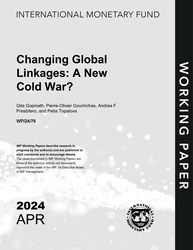
Changing Global Linkages: A New Cold War?
Changing Global Linkages: A New Cold War?
READ MORE...
Volume/Issue:
Volume 2024
Issue 076
Publication date: April 2024
ISBN: 9798400272745
$20.00
Add to Cart by clicking price of the language and format you'd like to purchase
Available Languages and Formats
| English |
Prices in red indicate formats that are not yet available but are forthcoming.
Topics covered in this book
This title contains information about the following subjects.
Click on a subject if you would like to see other titles with the same subjects.
Exports and Imports , Economics- Macroeconomics , Economics / General , Trade , Foreign direct investment , Geoeconomics , Fragmentation , supply chain resilience , restrictive policy , nonaligned connector , years of the Cold War , surge in policy , Trade balance , Imports , Trade agreements , Trade policy , Global
Summary
Global linkages are changing amidst elevated geopolitical tensions and a surge in policies directed at increasing supply chain resilience and national security. Using granular bilateral data, this paper provides new evidence of trade and investment fragmentation along geopolitical lines since Russia’s invasion of Ukraine, and compares it to the historical experience of the early years of the Cold War. Gravity model estimates point to significant declines in trade and FDI flows between countries in geopolitically distant blocs since the onset of the war in Ukraine, relative to flows between countries in the same bloc (roughly 12% and 20%, respectively). While the extent of fragmentation is still relatively small and we do not know how longlasting it will be, the decoupling between the rival geopolitical blocs during the Cold War suggests it could worsen considerably should geopolitical tensions persist and trade restrictive policies intensify. Different from the early years of the Cold War, a set of nonaligned ‘connector’ countries are rapidly gaining importance and serving as a bridge between blocs. The emergence of connectors has likely brought resilience to global trade and activity, but does not necessarily increase diversification, strengthen supply chains, or lessen strategic dependence.
Copyright © 2010 - 2026
Powered by:
AIDC



